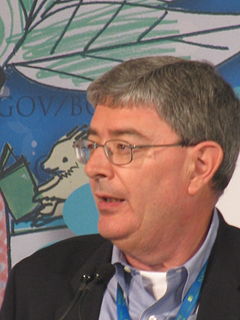
The Trilateral Commission is a non-governmental, non-partisan discussion group founded by David Rockefeller in July 1973 to foster closer cooperation among Japan, Western Europe, and North America.

A maquiladora ([makilaˈðoɾa]), or maquila, is a company that allows factories to be largely duty free and tariff free. These factories take raw materials and assemble, manufacture, or process them and export the finished product. These factories and systems are present throughout Latin America including Mexico, Nicaragua and El Salvador. Specific programs and laws have made Mexico’s maquila industry grow rapidly.
The Mexican peso crisis was a currency crisis sparked by the Mexican government's sudden devaluation of the peso against the U.S. dollar in December 1994, which became one of the first international financial crises ignited by capital flight.

The war on drugs is a campaign, led by the U.S. federal government, of drug prohibition, military aid, and military intervention, with the stated aim being to reduce the illegal drug trade in the United States. The initiative includes a set of drug policies that are intended to discourage the production, distribution, and consumption of psychoactive drugs that the participating governments and the UN have made illegal. The term was popularized by the media shortly after a press conference given on June 18, 1971, by President Richard Nixon—the day after publication of a special message from President Nixon to the Congress on Drug Abuse Prevention and Control—during which he declared drug abuse "public enemy number one". That message to the Congress included text about devoting more federal resources to the "prevention of new addicts, and the rehabilitation of those who are addicted", but that part did not receive the same public attention as the term "war on drugs". However, two years prior to this, Nixon had formally declared a "war on drugs" that would be directed toward eradication, interdiction, and incarceration. Today, the Drug Policy Alliance, which advocates for an end to the War on Drugs, estimates that the United States spends $51 billion annually on these initiatives.

George Weigel is an American author, political analyst, and social activist. He currently serves as a Distinguished Senior Fellow of the Ethics and Public Policy Center. Weigel was the Founding President of the James Madison Foundation. He is the author of the best-selling biography of Pope John Paul II, Witness to Hope and Tranquillitas Ordinis: The Present Failure and Future Promise of American Catholic Thought on War and Peace.

The Mexico–United States border is an international border separating Mexico and the United States, extending from the Pacific Ocean in the west to the Gulf of Mexico in the east. The border traverses a variety of terrains, ranging from urban areas to deserts. The Mexico–US border is the most frequently crossed border in the world, with approximately 350 million documented crossings annually.

Barry Julian Eichengreen is an American economist who holds the title of George C. Pardee and Helen N. Pardee Professor of Economics and Political Science at the University of California, Berkeley, where he has taught since 1987. Eichengreen currently serves as a Research Associate at the National Bureau of Economic Research and as a Research Fellow at the Centre for Economic Policy Research.
William D. Hartung is director of the Arms and Security Project at the Center for International Policy. He has also served as a Senior Research Fellow in the New America Foundation's American Strategy Program, and is former director of the Arms Trade Resource Center at the World Policy Institute. He specializes in issues of weapons proliferation, the economics of military spending, and alternative approaches to national security strategy. Hartung was the director of the Arms and Security Initiative at the New America Foundation. Prior to that, he served as the director of the Arms Trade Resource Center at the World Policy Institute. He also worked as a speechwriter and policy analyst for New York State Attorney General Robert Abrams
The Guadalajara Cartel was a Mexican drug cartel which was formed in the 1980s by Rafael Caro Quintero, Miguel Ángel Félix Gallardo and Ernesto Fonseca Carrillo in order to ship cocaine and marijuana to the United States. Among the first of the Mexican drug trafficking groups to work with the Colombian cocaine mafias, the Guadalajara cartel prospered from the cocaine trade.
William Chester Goodfellow is the director of the Afghanistan Peace Campaign, which builds public support for an enduring peace settlement that will end the war, bring U.S. troops home and promote national reconciliation in Afghanistan.

The Monroe Doctrine was a United States policy of opposing European colonialism in the Americas beginning in 1823. It stated that further efforts by European nations to take control of any independent state in North or South America would be viewed as "the manifestation of an unfriendly disposition toward the United States." At the same time, the doctrine noted that the U.S. would recognize and not interfere with existing European colonies nor meddle in the internal concerns of European countries. The Doctrine was issued on December 2, 1823 at a time when nearly all Latin American colonies of Spain and Portugal had achieved, or were at the point of gaining, independence from the Portuguese and Spanish Empires.
Richard Kevin Betts is the Arnold Saltzman Professor of War and Peace Studies in the Department of Political Science, the director of the Institute of War and Peace Studies, and the director of the International Security Policy Program in the School of International and Public Affairs at Columbia University. He is a senior fellow at the Council on Foreign Relations.
Robert Solin Leiken was an American intellectual, political scientist, and historian who worked at several U.S. universities and policy centers.
Barnett Richard Rubin, a political scientist, is a leading expert on Afghanistan and South Asia. He is the author of eight books and is currently Senior Fellow and Director at the Center on International Cooperation at New York University, a leading foreign policy center, as well as previously Senior Advisor to the US Special Representative for Afghanistan and Pakistan. Dr. Rubin has advised the United Nations, NATO, the United States and the Afghan government on numerous policy matters, including aid policy, security policy, and diplomatic strategy.
Bruce O. Riedel is an American expert on U.S. security, South Asia, and counter-terrorism. He is currently a senior fellow in the Saban Center for Middle East Policy at the Brookings Institution, and a professor at Johns Hopkins School of Advanced International Studies. He also serves as a senior adviser at Albright Stonebridge Group.
Wayne Cornelius is a U.S. scholar of comparative migration and Mexican politics and development. He received his B.A. from the College of Wooster in Wooster, Ohio. Cornelius founded the Center for U.S.-Mexican Studies at the University of California, San Diego in 1979, and directed it from 1979–1994 and 2001-2003. He is also the founding director of UCSD’s Center for Comparative Immigration Studies, established in 1999, which conducts comparative research on international migration and immigration policy, especially in the North American, Western European, and Asia-Pacific regions. Cornelius is also a Past President of the Latin American Studies Association. Cornelius has also been a Research Fellow of the Institute for the Study of Labor, and a member of the Council on Foreign Relations.
Founded in 1983, The Latin America Working Group (LAWG) is one of the United States' longest-standing coalitions dedicated to foreign policy. LAWG and its sister organization, the Latin America Working Group Education Fund, work with over 60 major religious, humanitarian, grassroots and policy organizations to influence decision makers in Washington, D.C.

Corruption in Mexico has permeated several segments of society – political, economic, and social – and has greatly affected the country's legitimacy, transparency, accountability, and effectiveness. Many of these dimensions have evolved as a product of Mexico's legacy of elite, oligarchic consolidation of power and authoritarian rule.

The 2014 American immigration crisis was a surge in unaccompanied children and women from the Northern Triangle of Central America (NTCA) seeking entrance to the United States in 2014. According to U.S. law, an unaccompanied alien child refers to a person under 18 years of age, who has no lawful immigration status in the U.S., and who does not have a legal guardian to provide physical custody and care. The surge increased rapidly, doubling in volume each year previously, reaching extreme proportions that provoked a response from the U.S. government in 2014 when tens of thousands of women and children from El Salvador, Guatemala, and Honduras migrated to the United States. Many of the children had no parent/legal guardian available to provide care or physical custody and quickly overwhelmed local border patrols.












